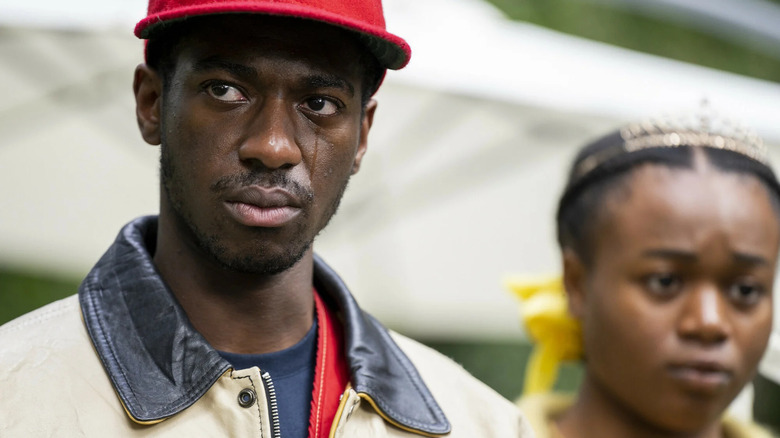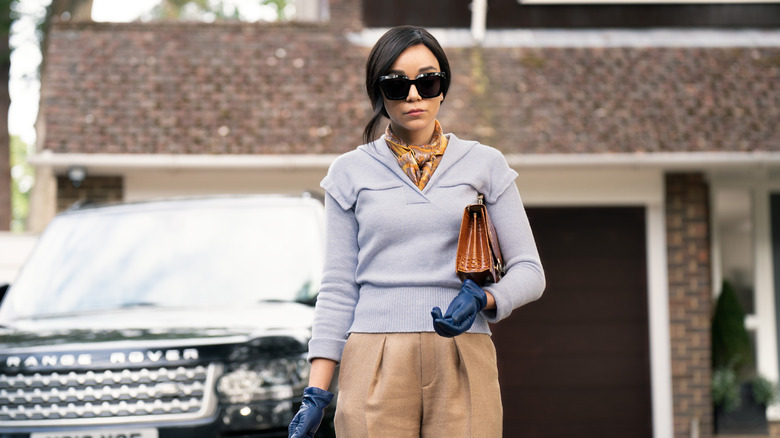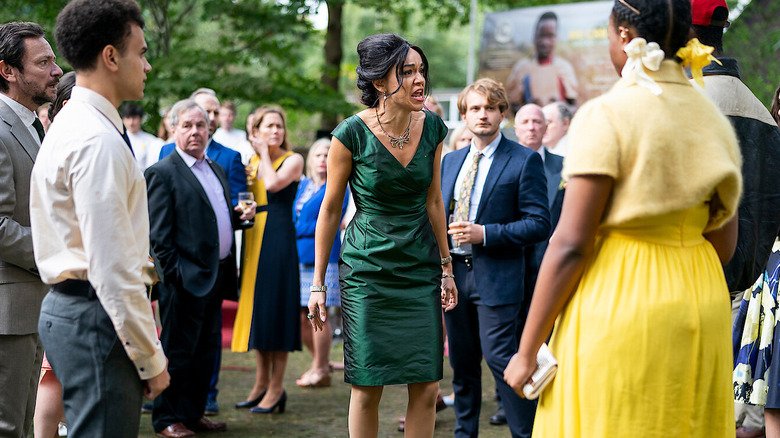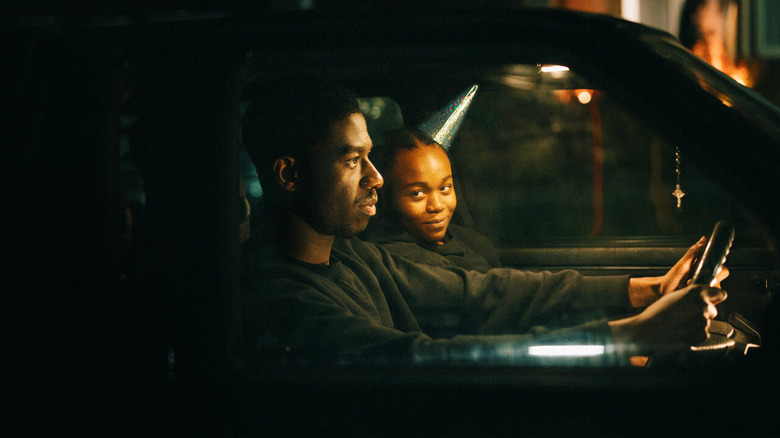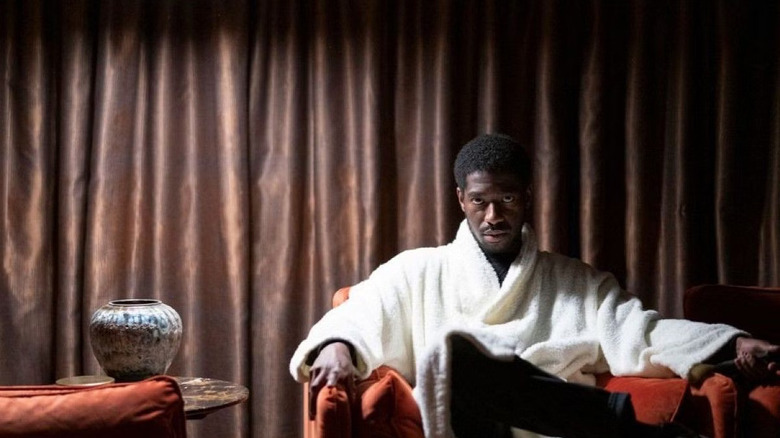A New British Horror Movie On Netflix Has Viewers 'Unable To Sleep'
There is a great story of directorial ingenuity related to Willem Dafoe's performance in "American Psycho." Mary Harron asked him to play his scenes as a private eye investigating the disappearance of Patrick Bateman's colleague in three different ways. First, he would act like he was totally clueless; then as if he was suspicious; and lastly, as if he was absolutely certain the psychotic yuppie was involved. She then cut the different takes together to keep audiences wrong-footed about how much his character knew.
"The Strays" plays like writer-director Nathaniel Martello-White attempted a similar trick, helming three different versions of the same story in a different genre, then taking an act from each. What we get is a frustratingly uneven movie that is scarier as psychological horror, works better as a social drama, and flunks completely as a home invasion thriller.
The influence of Jordan Peele hangs heavily over the film. Since "Get Out" was released in 2017, Peele has become one of the most influential directors around. Not only have his three movies to date been hugely successful at the box office, but they explored horror tropes through the lens of the Black experience in the U.S., inspiring directors of color to make their voices heard through their work.
The Peele effect is a mixed blessing for Martello-White and "The Strays." It might not have achieved the same buzz and visibility without its similarities to Peele's films — on the other hand, it suffers from high expectations and misleading preconceptions by inviting comparisons with "Get Out" and "Us." Nevertheless, it became Netflix's number-one movie in February, sharply dividing audiences and leaving some viewers unable to sleep with its disturbing conclusion. So what is "The Strays" and why has it provoked such a strong reaction?
What happens in The Strays?
"The Strays" opens in a dreary housing estate in London where Cheryl (Ashley Madekwe) is having a low day. She's up to her eyeballs in debt, struggling to pay the bills, and, as a light-skinned Black woman, feels discrimination all around her. She wants a better life for herself and decides to go out and get it. Leaving a note for her abusive partner saying she is popping to the hairdresser, she packs a bag and does a disappearing act instead.
Years later, Cheryl has become Neve, living in a middle-class neighborhood in the affluent village of Castle Combe in Wiltshire. She is the deputy head of a posh private school and married to Ian (Justin Salinger), with whom she has two children, Mary (Maria Almeida) and Sebastian (Samuel Small). She seems to have it all: A successful career as an educator, happy marriage, a beautiful home, and a respected position in a predominantly white community.
In order to integrate, she has fastidiously changed the way she talks, dresses, and wears straight-haired wigs, code-switching to fit in. She obsessively suppresses her ethnicity to the point that, according to her son, "anything Black is off limits." Yet her outward self-confidence and adopted middle-class accent mask deep-seated unhappiness and anxiety about her origins.
Cracks soon appear and Neve starts unspooling mentally when she spots two other Black people, Marvin (Jordan Myrie) and Abi (Bukky Bakray), apparently stalking her new family. It doesn't take much to guess that they are her kids from her previous relationship in London, and the movie rewinds to show how they have been traumatized by their abandonment. Now they're in Castle Combe to force their way back into her life.
Let's talk about that ending
I've read a lot of viewer comments about the conclusion of "The Strays." Despite middling reviews for the film itself, absolutely no one is saying "Meh" about that final shot. When Neve confronts Marvin and Abi at her charity gala — significantly, it is portrayed as her crowning achievement in the community — she discovers that they are her children from the life she walked away from years earlier.
Rather than deal with the issue head-on, she awkwardly pays them to go away instead. This understandably angers them, and the movie lurches into home invasion territory when they break in at night and terrorize Neve and her new family. Things escalate towards a murderous conclusion when Marvin, suffering from mental health issues, turns violent.
This is where writer-director Nathaniel Martello-White betrays his characters. In the middle act, he encourages us to empathize with Marvin and Abi by revealing their pain and trauma. In his desire to emulate Jordan Peele, however, he turns these victims into bog-standard home invasion villains in the finale. Marvin kills poor old Ian in the home gym by making him bench press more weight than he can handle. In the meantime, the Chinese takeaway he has forcibly ordered to celebrate Abi's birthday arrives.
Neve, seemingly numb with shock, answers the door while Marvin is murdering her husband. She accepts the food and asks the delivery guy to wait while she gets him a tip. Instead of doing the usual things like giving him a coded message to call the police, she collects her jacket and purse, walks out, and disappears on the back of the courier's motorbike, ditching all four of her children as Ian lies dead.
Viewer reaction to The Strays
Just after "The Strays" dropped on Netflix back in February, Joe reported some of the viewer reactions on Twitter:
"One user said of the flick: 'Just finished watching The Strays on Netflix and I think I'm scarred for life because what the hell did I just watch!'
A second warned: 'If you're trying to sleep well tonight, don't watch 'The Strays' right before bed.'
Another said: 'Just finished 'The Strays' on Netflix and immediately came to Twitter because what the hell did I just witness?'
It's easy to see why the film has had such an effect on viewers. The ending comes as a shock because Neve does something that mothers almost never do in a movie — walk out on her children in a deadly situation. It's a conclusion that has sharply divided opinions, with some viewers finding it laughable while others appreciate its boldness. I lean towards the latter, although I'm dubious about the way Nathaniel Martello-White presents it.
If "The Strays" was the straight social drama that it most resembles in the middle stretch, Neve running away would have been a terribly sad moment. Earlier in the film, she justifies leaving Marvin and Abi behind by saying that her previous relationship was an abusive nightmare. By abandoning her kids again, she reveals that this cycle of behavior is part of her nature, possibly exacerbated by mental health issues. From the opening scene, we can see that she is deeply depressed, and a glance at a belt hanging from a coat peg may indicate that she was considering suicide.
Martello-White's insistence on bundling up serious issues in a horror thriller package feels borderline frivolous. He lacks Jordan Peele's deft touch, and in the context of a generic home invasion finale, Neve's act of selfish betrayal comes as a slap in the face.
So is The Strays worth watching?
Nathaniel Martello-White has some important things to say in "The Strays," but they sit uneasily within a disjointed movie that tries on too many genre hats. He is determinedly topical with his screenplay, touching on issues like white flight and code-switching, where members of ethnic minorities adopt the mannerisms and culture of the majority to blend in. The Black British experience under Conservative rule and Brexit looms in the background too.
A newspaper headline reading "Black kids betrayed by schools" alludes to the government policy of diverting funds from deprived areas to more affluent Tory-voting shires. Later, one of Sebastian's fellow pupils incorrectly calls Marvin a "f***ing immigrant," reflecting the promise of reduced immigration that was a major selling point of the Brexit referendum for Leave voters in largely white counties like Wiltshire, where the film is mostly set.
The screenplay feels like it needed a few more drafts because a lot of these references are glaringly on the nose, and the treatment of Marvin and Abi in the last act is troublesome, to say the least. It's a shame because there is some good stuff here, including strong performances and a genuine sense of creeping unease in the early quiet moments. Your reaction to the divisive ending may depend on how you go into the movie.
If you are interested in the very real social issues that motivate the characters, it is one that lingers. If you go in expecting the psychological horror that it is unconvincingly dressed as, it may well irritate the hell out of you. I'm in the former camp, but the only thing that might make me lose sleep about "The Strays" is how much better it could have been if Martello-White had the courage to forge his own path instead of self-consciously trying to emulate Jordan Peele.
